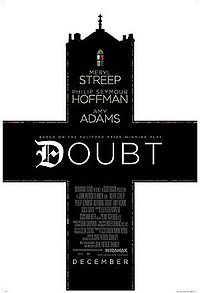Doubt
Posted by J on April 16, 2009
Though it features the Catholic church, Doubt is a fine morality play about modern Christian churches in general. Here  you have an authoritative nun, Sister Aloysius, who faces the wind of change blown in the early 1960s by the relatively new priest in her local parish, Father Flynn. Flynn, in the first sermon we hear from him, channels Paul Tillich by claiming that doubt is the essence of faith. Flynn says he wants to bring love, compassion, tenderness, and tolerance to the parish and Catholic school, while Sister Aloysius only seems to want to bring hard-headed authority. Flynn thinks the secular “Frosty the Snowman” would be a fine song to sing at the school’s Christmas pagaent, while Sister Aloysius thinks that the song is purely pagan superstition. So here’s the age-old fight between the revolutionary and the conservative.
you have an authoritative nun, Sister Aloysius, who faces the wind of change blown in the early 1960s by the relatively new priest in her local parish, Father Flynn. Flynn, in the first sermon we hear from him, channels Paul Tillich by claiming that doubt is the essence of faith. Flynn says he wants to bring love, compassion, tenderness, and tolerance to the parish and Catholic school, while Sister Aloysius only seems to want to bring hard-headed authority. Flynn thinks the secular “Frosty the Snowman” would be a fine song to sing at the school’s Christmas pagaent, while Sister Aloysius thinks that the song is purely pagan superstition. So here’s the age-old fight between the revolutionary and the conservative.
Caught between Father Flynn and Sister Aloysius is the young nun, Sister James. James is innocent and trustworthy. She’d like to be compassionate to her eighth grade students, who in Aloysius’ opinion would love to turn the wimpy compassion offered by James into rebellion. James would like to side with Father Flynn, but one day she notices something odd about the behavior of the relatively new black student. He is called to Flynn’s office in the middle of class, and he returns to class with alcohol on his breath. She reports this to Sister Aloysius, and here’s where the ball gets rolling.
Sister Aloysius, without firm evidence, thinks something inappropriate has happened between this black male student and Father Flynn. Aloysius pursues the truth, making firm accusations along the way, but how can she know? She may be completely wrong. With this scenario Doubt plays with our contemporary knowledge of the recent sex scandals in the Catholic Church. Father Flynn vehemently denies Aloysius’ charge, and Sister James, a possible witness to the scandal, would really like to believe Father Flynn is innocent.
SPOILER ALERT
So from here on I’ll discuss the movie looked at from the ending backward. You’d think, in a typical Hollywood production, that Sister Aloysius would be typecast as a grim, cruel authoritarian. To some extent she is, but then the movie makes room for the idea that such a person and position is necessary, especially in a school environment. Further, Aloysius represents old time values — specifically, for Catholics, the glory days before Vatican II. Father Flynn is obviously a Vatican II revolutionary, the kind of guy who thinks the church needs to modernize for the sake of … well, what exactly? Either the church, or possibly himself.
Flynn makes his case for change based on several points that political and religious “progressives” would love to associate themselves with. For example, absolute civil rights and social tolerance for nearly everyone and everything, including the idea that homosexuals are homosexuals by nature. While the movie makes room for a viewer’s acceptance of many of Flynn’s beliefs, it associates them with Flynn’s probable pedophilia. As we all know, being a pedophile today is the worst social sin one can commit, down there in a gutter with being labeled a racist. So it’s funny that Flynn wants to blow the wind of tolerance through the church — which would elicit a loud Hurrah! from a whole lot of people these days — but he does it while seducing little boys in the rectory.
What is the movie’s point of view? Which character does it side with? Obviously the writer-director, John Patrick Shanley (whose only other movie as a director is Joe Versus the Volcano, interestingly enough) has crafted a story built on the favorite aesthetic value of writers and artists since the mid-nineteenth century: ambiguity. What is really true, and who is really right? The movie does a fine job of leaving these questions open-ended, while humanizing all of the characters — the title of this movie says it all. We have no doubt that even a few viewers might sympathize with Father Flynn’s pedophilia. Still, it’s hard to say that — from the point of view of the mainstream in 2009 — Sister Aloysius isn’t ultimately the good guy (or nun).
It’s worth pointing out that there are a few theological howlers in the movie. It concludes with Sister Aloysius’ doubts, but if she is talking about her faith in God, she has a deep problem. Contra Tillich, doubt is a sin; it is the opposite of faith. Also, Sister Aloysius claims at least twice that she is “stepping away from God” in order to pursue Father Flynn. Either she is joking or stupid, because bringing sin to the light — especially such wickedness as Flynn is accused of — could never be called “stepping away from God.”
Entertainment: 9
Intelligence: 9
Morality: see above, but it’s far tamer than Kids-in-Mind says.
Leave a comment